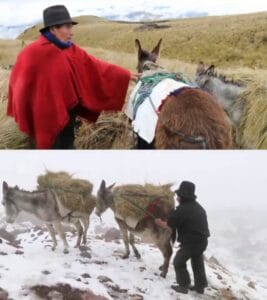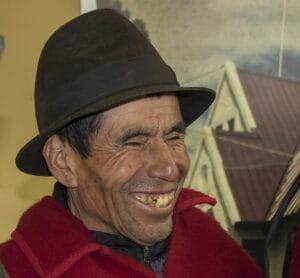
Before the advent of refrigeration, the only real way to get ice in the summer was to farm the ice that covered lakes in the winter, and store it in well-insulated ice houses. But what can be done in a subtropical place like Ecuador? Enter a hielero — iceman — like Ushca. Since he was 15 years old, Ushca has climbed Chimborazo, the country’s highest mountain (6,268m, 20,560 ft), taking a few donkeys loaded with straw. It takes about 5 hours to get high enough — around 4,500m (14,700ft) — to reach a glacier on the mountain, where he chipped out chunks of ice — 30-35 kg (65-80 lbs) each — wrapped each chunk in straw as insulation, loaded one or two on each donkey, and guided the laden beasts down to Riobamba to sell them. Each chunk brought Ushca around $4.00; with two trips a week, he made $30-40.
For centuries, the job was typically passed down from father to son. When Ushca started, about 40 other men went on the trek, including two brothers. Most dropped out due to the hard work, climate change induced shrinkage of the glaciers, causing longer and longer walks to get to the glacier (more recently the 5,400m level), and the low cost of electric freezers. Eventually, even his son-in-law found easier, and higher-paying, work, and Ushca made the trip alone, because merchants still wanted mountain ice to make specialty drinks and desserts for tourists. “I am happy when I walk,” he said. “Father Chimborazo looks after me.”

Being the last hielero brought Ushca fame: several film crews have made documentaries, and even Ecuador’s President boasted of Ushca’s work as exemplary of Ecuador’s cultural heritage. “My family is envious that I am a friend of President Correa,” he once said. “I tell them, just come and do my work.” He didn’t retire until he was around 73, at which time he went back to school and got his diploma. He then worked at a museum to tell tourists of the work he did. He also did plenty of chores around the house, including tending to livestock. Recently, a bull “overpowered Taita [‘uncle’] Baltazar and threw him to the ground, causing him serious injury,” announced the municipality of Guano, where he lived. Ushca died shortly after, on October 11, at 80.
